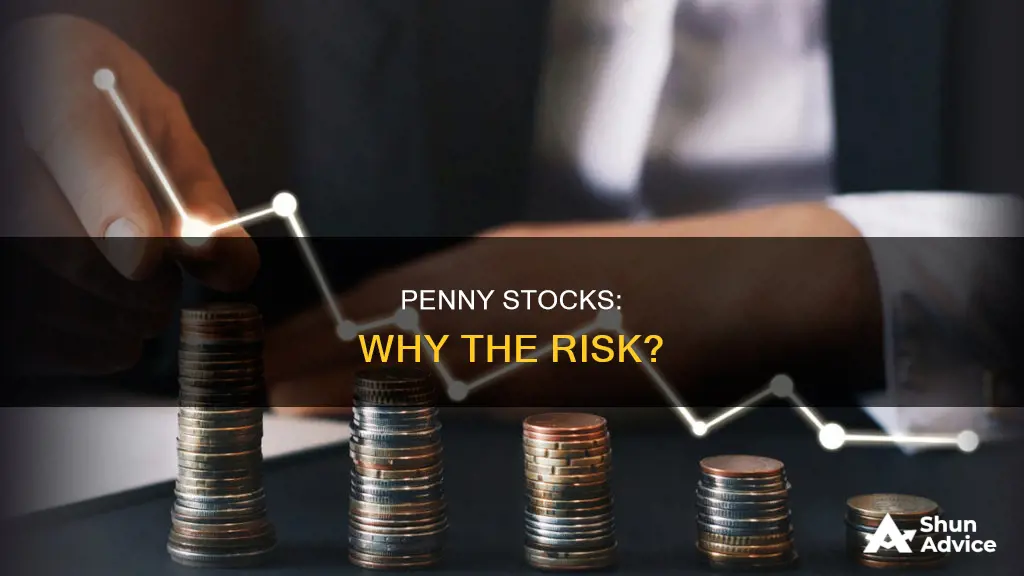
Penny stocks are high-risk investments that can leave investors facing significant losses. They are often heavily promoted, especially on social media, and are prone to pump-and-dump schemes. While they can skyrocket in value, these cases are rare.
Penny stocks are not subject to the same disclosure requirements as other securities, and trade on the over-the-counter (OTC) market, which is not as heavily regulated as the NYSE or NASDAQ. This lack of oversight and regulation means that individuals who pump and dump penny stocks often face little accountability, allowing them to perpetrate scams repeatedly.
Penny stocks are also associated with high volatility and limited liquidity, making it difficult for investors to sell once the stock crashes. The lack of available information and poor liquidity also make penny stocks an easy target for fraudsters.
Due to these risks, many people choose to avoid investing in penny stocks.
| Characteristics | Values |
|---|---|
| High-risk | Potential for significant investor losses |
| Low-priced | Less than $5 per share |
| Lack of information | Not subject to the same disclosure requirements as other securities |
| Lack of oversight | Not traded on major exchanges like NYSE or NASDAQ |
| Lack of accountability | Individuals who pump and dump penny stocks often face little to no accountability |
| High volatility | Wild price swings |
| Limited liquidity | Difficult to buy or sell shares quickly without impacting the price |
| Scams and fraud | Pump-and-dump schemes |
What You'll Learn
- Penny stocks are high-risk investments with a high potential for fraud and loss
- They are often traded over-the-counter or on the pink sheets, which have less rigorous reporting requirements
- Penny stocks are usually issued by small, unproven companies with dubious long-term prospects
- They are prone to pump-and-dump schemes, where scammers inflate the price and then sell off their shares, causing the price to crash
- Penny stocks are illiquid, making it difficult to sell shares without lowering the price

Penny stocks are high-risk investments with a high potential for fraud and loss
Penny stocks are high-risk investments that can leave investors facing significant losses. They are often heavily promoted or "pumped", especially on social media, and while they can skyrocket in value, these cases are few and far between.
There are several factors that make penny stocks a risky investment:
- Lack of Information: Penny stocks are not subject to the same disclosure requirements as other securities, and many offerings are outright scams.
- Lack of Oversight: Penny stocks trade on the over-the-counter (OTC) market, which is not as heavily regulated as major exchanges like the NYSE or NASDAQ.
- Lack of Accountability: Due to the lack of oversight and regulation, individuals who engage in pump-and-dump schemes often face little to no accountability.
- High Volatility and Limited Liquidity: The penny stock markets are highly volatile, and once a penny stock crashes, investors may find it difficult to sell.
- Scams and Fraud: Investment scams and other forms of fraud are a significant concern in the penny stock market, and this alone can lead to substantial losses for investors.
Penny stocks are also usually traded outside of major market exchanges, making them riskier. A lack of history and information, as well as low liquidity, further contribute to the high risk associated with these investments.
While it is possible to make money with penny stocks, it requires the ability to separate the good companies from the bad, which involves conducting thorough research and analysis. Penny stocks are not recommended for those who are new to investing or who cannot handle high levels of volatility.
Why People Avoid Investing
You may want to see also

They are often traded over-the-counter or on the pink sheets, which have less rigorous reporting requirements
Penny stocks are often traded over-the-counter or on the pink sheets, which are both types of decentralised over-the-counter (OTC) markets. In OTC markets, stocks are traded directly between two parties without a broker.
The pink sheets are so-called because they used to be printed on pink paper. Now, they are compiled electronically.
Penny stocks are traded on the pink sheets because they are not listed on major exchanges like the New York Stock Exchange (NYSE) or Nasdaq. This means they are not subject to the same rigorous financial reporting requirements as publicly traded companies on major exchanges.
The U.S. Securities and Exchange Commission (SEC) warns that stocks traded over the counter tend to be highly illiquid and volatile. They are often the targets of manipulation and scams.
The pink sheets are divided into three tiers: those that provide no information, limited information, and current information. Pink sheet companies only need to submit two annual reports, an attorney letter covering all relevant information, and a company profile. This means that there is very little information available about them, making them a risky investment.
Investing: Wealth and Security
You may want to see also

Penny stocks are usually issued by small, unproven companies with dubious long-term prospects
Penny stocks are often issued by tiny companies, with even the largest penny stock companies typically valued at much less than $100 million. These companies are usually less-established and have not proven they can endure and succeed. They are unproven and small, with questionable long-term prospects for success.
Penny stocks are also usually not listed on major exchanges such as the New York Stock Exchange or Nasdaq. Instead, they are often traded over the counter, on the pink sheets, or on the electronic OTC Bulletin Board (OTCBB) system. This means that the companies issuing penny stocks are not subject to the same rigorous reporting requirements as those on the NYSE or Nasdaq, making it difficult to adequately research them before investing.
The lack of reporting requirements also makes penny stocks an easy target for fraudsters. Penny stocks are sometimes the targets of pump-and-dump schemes, where con artists promote a penny stock company as the next hot investment, building hype to inflate the share price, and then selling their shares for a profit after the price increases.
Penny stocks are also highly volatile, with wild price swings, and once a penny stock crashes, it can be difficult for investors to sell.
Investing in Movies: How to Get Started
You may want to see also

They are prone to pump-and-dump schemes, where scammers inflate the price and then sell off their shares, causing the price to crash
Penny stocks are a class of low-priced, high-risk stocks that are prone to pump-and-dump schemes. These schemes involve scammers artificially inflating the price of a stock and then selling off their shares, causing the price to crash and leaving other investors with worthless stock.
In a pump-and-dump scheme, fraudsters first promote a stock they hold by spreading false, misleading, or exaggerated statements. They may use social media, investment newsletters, online advertisements, emails, or even cold calling to reach potential victims. By spreading rumours and misinformation, they create a buying frenzy that drives up the stock's price. This is the "pump" part of the scheme.
Once the stock price has risen, the scammers sell off their shares at a profit, which is the "dump" part. They may also stop hyping the stock, causing the price to fall even further. As a result, unsuspecting investors who bought into the hype are left holding worthless stock, resulting in significant financial losses.
The lack of publicly available information about penny stocks, or microcap companies, makes them particularly vulnerable to pump-and-dump schemes. Scammers take advantage of the low liquidity and small float of these stocks, as it doesn't take many new buyers to push the stock price higher. Additionally, the small size and unproven nature of the companies issuing penny stocks make it easier for fraudsters to manipulate their stock prices.
To avoid falling victim to pump-and-dump schemes, it is important for investors to be cautious of "hot tips" or "the next big thing" promotions. Conducting thorough research and being wary of unsolicited stock tips can help investors avoid these scams.
Chinese Investors: Where They Put Their Money
You may want to see also

Penny stocks are illiquid, making it difficult to sell shares without lowering the price
Penny stocks are generally considered to be high-risk investments. One of the reasons for this is that they are often illiquid, making it difficult for investors to sell their shares without lowering the price.
Penny stocks are shares in companies with small market capitalisations that trade for a relatively low price per share. They are usually traded outside of major stock exchanges, such as the New York Stock Exchange (NYSE) or the Nasdaq Composite Index (NASDAQ).
The companies whose shares are traded as penny stocks are often very small, with even the largest penny stock companies typically valued at less than $100 million. They are also often unproven, with little or no track record of success. This lack of history, combined with low liquidity, makes penny stocks a risky prospect for investors.
Low liquidity means that it can be hard to find a buyer for a particular stock. An investor may be forced to lower their asking price until it is considered attractive to another buyer. This can result in an investor losing money on their shares, even if the share price has risen since they bought it.
Low liquidity also provides opportunities for market manipulation by traders. One common tactic is the "pump and dump" scheme, in which a large number of shares are bought, hyped up, and then sold at a profit after other investors have driven up the price.
Because of the risks associated with penny stocks, they are generally not recommended for most investors. However, for those who are interested in the potential for high returns, it is important to do extensive research and understand the risks involved.
Investing: What They Don't Tell You
You may want to see also
Frequently asked questions
Penny stocks are high-risk investments that can leave investors facing significant losses. Penny stocks are associated with trade infrequency and low liquidity, which makes it difficult to identify a price that reflects the company's worth. They are also susceptible to "pump and dump" schemes, where scammers hype up a stock as "the next big thing" and then sell it after the price has skyrocketed, leaving investors with poor returns or losses.
Penny stocks are considered riskier than regular stocks due to a lack of history and information, as well as low liquidity. They are also not subject to the same disclosure requirements as other securities and often lack oversight and regulation, making them an easy target for fraudsters.
Be cautious of biased recommendations and paid promotions. Many penny-stock companies pay individuals to recommend their stock or promote it through newsletters, financial news outlets, and social media. These recommendations should be taken with a grain of salt, especially if the people or companies promoting them are being paid. Additionally, be wary of pump and dump schemes, where stock prices are artificially inflated through hype and then sold off by scammers, leaving investors with losses.







